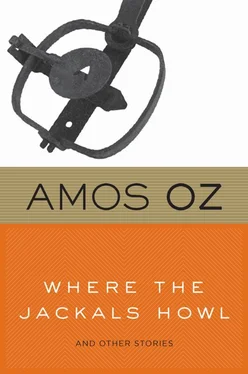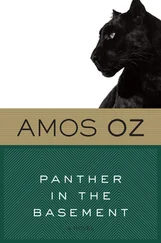Amos Oz - Where the Jackals Howl
Здесь есть возможность читать онлайн «Amos Oz - Where the Jackals Howl» весь текст электронной книги совершенно бесплатно (целиком полную версию без сокращений). В некоторых случаях можно слушать аудио, скачать через торрент в формате fb2 и присутствует краткое содержание. Год выпуска: 2012, Издательство: Houghton Mifflin Harcourt, Жанр: Современная проза, на английском языке. Описание произведения, (предисловие) а так же отзывы посетителей доступны на портале библиотеки ЛибКат.
- Название:Where the Jackals Howl
- Автор:
- Издательство:Houghton Mifflin Harcourt
- Жанр:
- Год:2012
- ISBN:нет данных
- Рейтинг книги:4 / 5. Голосов: 1
-
Избранное:Добавить в избранное
- Отзывы:
-
Ваша оценка:
- 80
- 1
- 2
- 3
- 4
- 5
Where the Jackals Howl: краткое содержание, описание и аннотация
Предлагаем к чтению аннотацию, описание, краткое содержание или предисловие (зависит от того, что написал сам автор книги «Where the Jackals Howl»). Если вы не нашли необходимую информацию о книге — напишите в комментариях, мы постараемся отыскать её.
Where the Jackals Howl — читать онлайн бесплатно полную книгу (весь текст) целиком
Ниже представлен текст книги, разбитый по страницам. Система сохранения места последней прочитанной страницы, позволяет с удобством читать онлайн бесплатно книгу «Where the Jackals Howl», без необходимости каждый раз заново искать на чём Вы остановились. Поставьте закладку, и сможете в любой момент перейти на страницу, на которой закончили чтение.
Интервал:
Закладка:
The stairs creaked again. A thrill passed through his body. His fingers turned pale. Heavily the stranger climbed another step, then another, and a third, coughed, and then paused. And again the stillness of death descended on the house, on the street, and on the city. This time Dov ran into the kitchen. Close the window. Seal the lattice. Keep the light on.
Until a few years before he had been teaching geography to a junior class of the national secondary school. Hundreds of pupils had passed through his hands over the years. They used to respect his grayness and obey his gray voice. Rumors proliferated among them and passed from generation to generation, rumors concerning the elderly schoolmaster who was once a leading figure in the underground and one of the founding fathers of the kibbutz movement. As they gripped the chalk his fingers looked strong and decisive. With one firm sweep of his hand he was capable of drawing a thin, straight line that no ruler in the world could have improved upon. Sometimes he would try to entertain his class: his jokes were thin, gray. Occasionally he would suddenly become animated by a sort of restrained pathos, and something would come alive in his eyes. This would be interpreted by his pupils as anger; it would fade and disappear as suddenly as it had arisen.
Two or three times a year he used to put on khaki clothes, take a bundle of maps and a smart army knapsack that always aroused envy in the hearts of his pupils, and lead a party of schoolchildren on a hiking tour. He cut a strange and almost eccentric figure in his hiking gear: tattered windbreaker with many pockets and buckles, tall walking boots, a rather antiquated firearm that he called a Tommy gun. With his pupils from the intermediate classes he would often climb to the heights of the hills of Naphtali, and with his senior students he used to cross over Little Crater to the Scorpion’s Path and beyond, to the Meshar.
Once, during one of these trips, Dov’s party was held up in Beersheba. A representative of the Military Authority told them to change their route and not to pass through the Desert of Paran. For security reasons. In a general sense; he did not go into details. The officer was thin and tall, curly-haired, barefoot and taciturn, his uniform disgracefully casual. It was four years since Dov had seen this young man. Four years before the young man had come to Jerusalem for some congress or other and had spent two nights in Dov’s apartment. The first night he arrived with a girl whom he did not even bother to introduce to his father, and the second night there were two girls with him. Dov remembered the beauty of these girls, the softness of their voices, the muffled laughter from the sleeping bags in the early morning. Now he did not know what words he could use, or if the proper words even existed. His pupils pressed around him and the thin officer, and he found nothing to say.
“Anyway,” said Ehud casually, drawling as if too lethargic to move his lips and speak intelligibly, “anyway, as far as I’m concerned the best thing you can do is turn around and go home. We’ve got enough problems as it is. We don’t need schoolkids and teachers here. Still, seeing as you’ve got this far, you may as well go on a little farther. Head straight for Eilat, sing your “Southward Ho!” songs there, and go home. Don’t waste any time on the way.”
The teacher let his shoulders droop. He was taller and more powerfully built than the arrogant officer. In the days of the War of Independence he had been a staff officer in the Negev, with the rank of lieutenant colonel. But at that moment he could not speak of these things to his pupils or to the drowsy youth who stood before him chewing something, perhaps gum, perhaps his tongue.
“I know,” he murmured, “you don’t need to tell me. I know.” The Beersheba sun drew sweat from every pore of his body. “I know this terrain much better than you do. I was fighting here in the Negev when you were so high.”
“OK,” said the curly-haired officer, “fine, OK, just don’t start giving me your memoirs now. If you know the terrain, you can stop wasting my time. I’ve got too many tourists making nuisances of themselves. Good-bye.”
“Just a moment,” said Dov angrily, “one moment, please. Listen. In my day they would have cleared the area of terrorists within twenty-four hours. What’s the matter with you people? You let infiltrators stroll around the Negev as if it were the Baghdad bazaar. What have you got to be so arrogant about? Why don’t you do something, instead of chasing girls?”
The schoolchildren were stunned. Even Ehud was taken aback. He turned. The ghost of a smile passed over his lips and disappeared.
“Pardon?”
“It’s just… what I meant was, perhaps we could talk about this, just the two of us. Not now. Why don’t you drop in some time? Why not, really?”
“Why not? Some night in the summer,” he said. “I’m taking these miserable clods of mine out for some training in the Adullam hills. Making tigers out of alley cats. That would be a real shock for you, wouldn’t it, if I turned up some time in the middle of the night to take a shower at your place and sleep for a couple of hours.”
Later, when the summer was over, Dov’s request was granted, and he was allowed to take a last look at the lean and tousled officer. Something about him had changed. The pride of those casual lips had disappeared. Little night predators had eaten half his face.
In the course of every one of these trips Dov Sirkin would raise his voice — only slightly — and give a brief and fluent lecture on terrace cultivation in Galilee, or on the export of minerals and merchandise to Africa and Asia through the Red Sea Straits. His eyes were as sharp as the needle of a compass. At times he would suddenly halt the bored and weary party, point to a silent ruin, and tell a story. Or he would show the hikers an innocent-looking mound and say: There is a mystery hidden here. Sometimes in the desert he would sniff out the skeleton of a camel, a hyena, or a jackal. Or a spring that an inexperienced traveler would be unable to find even if he was dying of thirst twenty paces from it.
After such trips Dov Sirkin used to ask the Hebrew teacher to lend him the notebooks in which the pupils had described their expedition — a thousand versions of a thousand trifling details. Even in the most mundane account Dov would find something of interest. Sometimes he even took the trouble to copy items from his pupils’ essays into his own journal, before returning the notebooks to the Hebrew teacher and the journal to the bottom drawer of the brown Berlin-style chest of drawers.
Geula used to come once a year, on the eve of Independence Day. After the festival she would always return to the kibbutz. Throughout the night and the morning after, she would sit by herself on Dov’s little balcony, watching with trembling lips the fireworks erupting in the Jerusalem sky and in the sky above the mountains and the desert, listening to the loudspeakers blasting out their message far away in the main thoroughfares of the city, chain-smoking as she watched the young people singing their festive songs. She called her father Dov. She never talked to him about herself, or about her mother and brother. She spoke sometimes about Ben-Gurion, about the politics of moderation and restraint as opposed to the politics of revenge and summary retaliation. Altermann she considered a very Polish poet, incorrigibly in love with the tools of power, in love with death. Dov tried hard to engage her in conversation, to understand, to influence, but Geula asked him not to disturb her as she listened to the dance music from Terra Sancta Square and imagined the distant revelry. At the funeral Dov said to her, “You must, you must believe me when I say that I had no idea. How could I have known?”
Читать дальшеИнтервал:
Закладка:
Похожие книги на «Where the Jackals Howl»
Представляем Вашему вниманию похожие книги на «Where the Jackals Howl» списком для выбора. Мы отобрали схожую по названию и смыслу литературу в надежде предоставить читателям больше вариантов отыскать новые, интересные, ещё непрочитанные произведения.
Обсуждение, отзывы о книге «Where the Jackals Howl» и просто собственные мнения читателей. Оставьте ваши комментарии, напишите, что Вы думаете о произведении, его смысле или главных героях. Укажите что конкретно понравилось, а что нет, и почему Вы так считаете.












